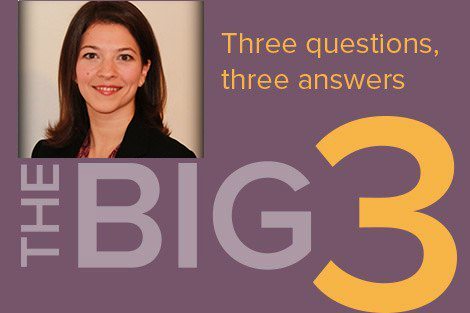October 17, 2019—Claudia Trudel-Fitzgerald, a research scientist and clinical psychologist at The Lee Kum Sheung Center for Health and Happiness and in the Department of Social and Behavioral Sciences at Harvard T.H. Chan School of Public Health, is first author of a recent study that found a connection between greater “social integration” and longer life in midlife women.
What is social integration and how might it be beneficial for women’s health and longevity?
In our study, we found that women who were more socially integrated at around age 60 were living longer and were more likely to reach age 85 or older.
Social integration includes the number of people someone has in their network, and the frequency of their interactions with this network through varied activities. For example, having a spouse or partner, several close friends or relatives, and regularly participating in religious and non-religious activities are indicators of high social integration. For health and longevity, it’s generally understood that the higher the social integration, the better.
Having such a wide social network could be helpful for living a long and healthy life in a variety of ways, including providing encouragement to adopt healthier habits and follow medical recommendations, or simply having access to a ride to medical appointments. Studies have also shown that socially integrated individuals are less likely to be depressed or to have sustained levels of inflammation and high blood pressure. These factors in turn could contribute to longevity, as well.
Is it better to have a wide network or deep connections?
These are actually two different indicators of one’s social environment that researchers have been investigating in relation to physical health. On one hand, “social integration” refers to the structure of social relationships—the number of people in your network or the frequency of activities that you engage in that involve other people. It doesn’t talk about the quality of the relationships. “Social support,” on the other hand, refers to the strength of your emotional bond with someone and how well you can rely on them—for instance, for access to resources and information.
In general, research on social integration has shown associations that are a little more consistent for physical health outcomes compared to social support. But it’s complicated. One person could have a high level of social integration, but with mostly shallow connections that are not supportive. On the other side, you can have people who have fewer social relationships, but strong social support. They feel encouraged in their lives, and have someone they can turn to if they encounter challenges. The research now needs to go a little deeper into how interactions between social integration and social support influence physical health outcomes, including longevity.
What types of interventions might be helpful for socially isolated seniors?
More studies are needed on what could be done at a societal level, but there are some things that socially isolated seniors can do. People could join a new spiritual community, volunteer for a cause, try a new hobby, or reconnect with an old friend or family member. Even calling a free, confidential helpline can be beneficial. Just feeling that connection with someone can help people feel less isolated.
Studies looking at whether social media is beneficial for social integration have been mixed. It may make certain people feel more integrated and less isolated, therefore enhancing their emotional well-being, but it can also make other people feel lonely and depressed when they compare themselves to other people’s posts. Most seniors are not on social media, but for some it could be helpful. For example, seniors living apart from their family members might feel more socially integrated by looking at pictures of their grandkids on Facebook. As social media research is rapidly developing, researchers are increasingly using data from platforms like Facebook and Twitter to understand how the virtual social environment can impact one’s mental and physical health.
